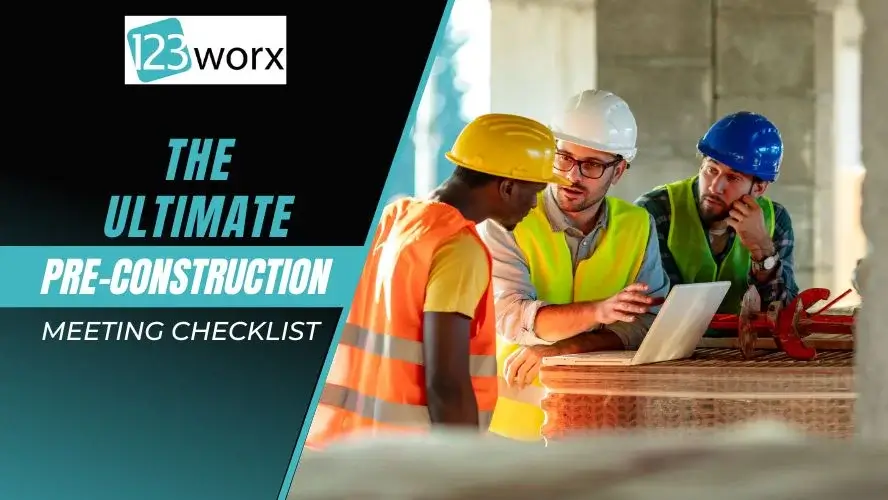The most essential step in making a new construction project successful is conducting a thorough pre-construction meeting. This prime stakeholder gathering will outline the pace of smooth and efficient work on the project, align expectations, ensure clear communication, and examine potential problems that can be foreseen.
The pre-construction meeting is a precious platform where all shareholders listen, work, and share views toward a common project vision. This helps lessens risk, prevents late work, and builds a working atmosphere that values teamwork and responsibility.
Understanding The Purpose of A Pre-Construction Meeting Checklist
While the idea of a pre-construction meeting makes sense, but its real impact lies in how well the developed checklist is created and used.
A good pre-construction meeting checklist will be like a road map that guides you through key points of discussion and addresses what needs to be done before the start of a project.
This guarantees that every important point is included and that all parties know the project’s objectives, timelines, and responsibilities. This planned approach will streamline the meeting process and help lay the foundation for other effective communication and coordination throughout the project’s life.
Key Elements To Include in A Pre-Construction Meeting Checklist
A good pre-construction meeting checklist should have varied essential elements to make it comprehensive and effective.
Here are the few key elements it comprises:
- Project Overview and Scope: Clearly state the goals, range, and expected outcomes of the project in such a way that every key parties involved can understand.
- Roles and Responsibilities: Pinpoint and allocate specific duties within the team to guarantee responsibility and clear communication.
- Project Schedule and Milestones: Think about the project’s duration, main events, and possible problems that could disrupt the timeline.
- Safety and Quality Assurance: Describe specific project requirements, list safety procedures, and detail how to uphold proper quality standards and necessary rules that must be followed during the project.
- Site logistics and access: Discuss site accessibility, parking structure, material storage, and any disruptions and restrictions that could slow down the project.
- Reporting and Communication: Establish easy ways to communicate, fix rules to report, and find ways to solve problems and concerns during the project.
- Risk Management and Contingency Planning: Find possible problems and plan to lessen their effects to protect the project timeline and funds as much as possible.
- Contract and Legal Requirements: Go over important legal rules, permits, or contract things that need to be followed.
- Financial and Payment Procedures: Payment schedules and invoice procedures need to be discussed herein to realize essential financial requirements or peculiarities that have to be emphasized.
- Sustainability and Environmental Concerns: Indicate in the project description any environmental goals or requirements, including any adoption of green building practices.
Preparing For A Pre-Construction Meeting
Planning is essential in making a useful pre-construction meeting.
Below are the steps to keep the session structured and productive:
- Assemble the Right Team: Identify and involve all key players, from the project owner to general contractors and subcontractors to architects, engineers, and more. These people are necessary for the workload.
- Distribute Agenda and Checklist: Make sure to dispense the meeting’s plan and checklist in due time to everyone involved in the meeting. This allows them to understand their roles and prepare any needed information in advance.
- Gather Required Documents: Obtain and organize all relevant documentation, such as contracts, plans, specifications, permits, and other materials required for reference at a meeting.
- Conduct Site Visits: If possible, organize a site visit before the meeting. This lets everyone attending the meeting get an overview of the project site and consequently learn about possible issues or considerations ahead of time.
- Prepare Presentation Materials: Develop visual elements, such as presentations or handouts, intended to deliver the most critical information to be discussed among the meeting participants.
Conducting A Pre-Construction Meeting Effectively
Once you’re ready and you’re fully prepared, it’s time for your preconstruction meeting. Now, here are the best practices for ensuring a productive and efficient gathering:
- Establish ground rules: Be clear at the very beginning about participation, respectful communication, and the decision-making process.
- Follow the Agenda: Stick to the pre-set agenda so that all crucial topics are covered and the conversation stays on track.
- Encourage Open Dialog: Establish an atmosphere of open communication that encourages all parties involved to express concerns, ask questions, and give their views.
- Assign Action Items: During the meeting, assign individual tasks clearly. Identify the individual to whom the action items will be transferred, including the due dates and follow-up procedures.
- Document Decisions and Notes: Have someone on hand to jot down all the important decisions, tasks, and critical discussions for later review and future reference.
- Resolve Concerns and Conflicts: If there are conflicts or disagreements, resolve them professionally and promptly. Also, seek common ground or go through the right process.
- Summarize and Confirm Next Steps: Restate critical decisions, action items, and next steps to close the meeting. This guarantees everyone leaves knowing and agreeing with what was sorted out.
Addressing Common Challenges And Concerns During A Pre-Construction Meeting
Even though pre-construction meetings aim to deal with issues beforehand, difficulties and concerns can still arise in the discussion.
Here are a few common challenges and some ways to deal with them:
- Budget Constraints: Look for areas where money could be saved in terms of the budget. Consider priority, importance of elements, and value engineering options that can be taken without compromising quality and safety.
- Schedule Conflicts: If a scheduling conflict arises or there is a concern with the timeline, work with your team to find a resolution, perhaps through reorganize resources or create concurrent tasks.
- Regulatory or Legal Concerns: If you face anything involving legal concerns, consult with appropriate expertise. Review relevant documentation, then develop the right plan for compliance and risk mitigation.
- Communication Barriers: If the barrier to communication is language, culture, or people’s inability to understand each other, use a translator, define terminology, or simply have mediators in place.
- Conflicting priorities: Establish open conversation routes for finding common ground, make necessary adjustments in vital areas, and agree on parts that align with the project’s overall key goals.
Ensuring A Smooth And Successful Project Start Through A Pre-Construction Meeting Checklist
An effective pre-construction meeting and a well-crafted checklist set the foundation for a smooth and successful project start.
The following are some of the reasons this approach could be pretty beneficial:
- Aligned expectations: The pre-construction meeting helps to align all stakeholders with the project objectives, scope, and requirements to avoid misconceptions and conflicts down the road.
- Effective Communication: Set up a system that creates straightforward pathways and guidelines for communication during the pre-construction meeting. This will aid in the easy exchange of ideas and teamwork throughout the project’s life cycle.
- Risk Mitigation: This involves identifying and finding potential risks and challenges by designing and actualizing contingency plans. These proactive measures ensure their impact is mitigated as far as the project’s progress is concerned.
- Better Coordination: The pre-construction meeting brings together all the stakeholders, establishing a collaborative working environment and allowing for smooth coordination of all the teams and disciplines.
- On-Time Delivery: Tackling obstacles and planning a comprehensive project schedule at a pre-construction conference makes delivery on time more achievable.
- Cost Optimization: During the pre-construction meeting, the budgetary constraints, potential value engineering, and the impact on cost savings are among the discussions that aim to optimize project costs to avoid costly overruns.
- Enhanced Quality: The pre-construction meeting is where we discuss everything about quality. From safety demands to project standards, we aim to ensure the highest possible quality.
Best Practices for Utilizing A Pre-Construction Meeting Checklist
Use the following best practices to make your pre-construction meeting checklist most effective:
- Customize the Checklist: Align the checklist with the project’s specific needs and requirements to capture relevant aspects and concerns from the stakeholders.
- Assign Ownership: Designate one person should be responsible for the entire checklist. This ensures all tasks are done, and any agreed-upon actions are monitored.
- Encourage Collaboration: Get all stakeholders involved in developing and reviewing the checklist to ensure ownership; diversity in thought and views is needed.
- Continual Refinement: Allow the checklist to be a living document. Consider continually reviewing and refining the checklist as you learn more and get feedback from past projects.
- Use Technology: Project management software or any digital tool can make creating, sharing, and monitoring checklists easier. This can increase the level of convenience and speed of access and collaboration.
- Integrate with Other Project Management Processes: In other project management scenarios, it’s crucial to incorporate the pre-construction meeting checklist with other general procedures. This will assure smooth flow and continuity for the whole project duration.
The Value of A Comprehensive Pre-Construction Meeting Checklist
A pre-construction meeting checklist is one perfectly crafted tool that makes a tangible difference in ensuring a smooth and successful start to a project.
Involving all key stakeholders, lining up goals, and tackling potential problems likely to be faced provide the foundation for solid communication, teamwork, and lessening risks. The energy spent making a detailed list and organizing a meeting before work starts is worth it. It promotes unity, boosts teamwork, keeps costs in check and increases the chances to meet the goals for quality, speed, and overall project objectives throughout the project’s life.
Just remember, every construction project is unique, so create your pre-construction meeting checklist according to your needs and the needs of your project.
Be proactive and organized, and you are one step closer to an accomplished project that outshines your owner’s expectations.

As a Vice President at 123worx, Construction Management Platform, Bharat Rudra has worked with hundreds of business executives searching for best-suited software for their construction business with a wide array of requirements. Bharat takes pride in helping construction businesses solve their business and project management challenges. Feel free to reach Bharat if you have any questions. You can find him on LinkedIn or reach him at brudra@123worx.com

